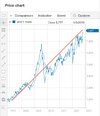- Joined
- 21 November 2022
- Posts
- 389
- Reactions
- 989
Getting that 8% return in the twighlight of your life comes with greater risk . That 20-30% drawdown at the wrong time can devastate income earning ability . The amount of coin required to retire relatively stress free and comfortably is 7 figures . Proactive approaches required and for most thats impossible skillset to learn at this stage of life . Managed funds are hamstrung and the only real way of proactively managing your retirement is SMSF . The average punter has almost zero hope .yes getting a positive return after real inflation , can be very challenging , a term deposit rarely does it nor does a Treasury Bond , you can be lucky sometimes and do it with ( some ) corporate bonds



